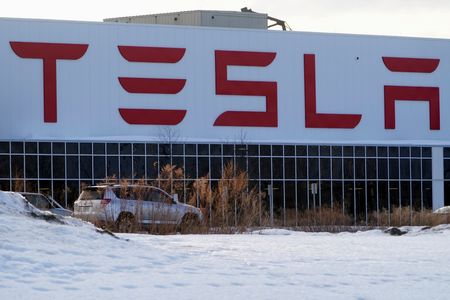By Daniel Wiessner
(Reuters) -Tesla has been accused by a U.S. labor agency of discouraging workers at a Buffalo, New York, assembly plant from union organizing by barring them from using phones and other devices, an agency spokeswoman said on Thursday.
A National Labor Relations Board (NLRB) official issued a complaint late Wednesday claiming Tesla’s workplace rule banning personal technology use, recording, and storing or sharing content violates U.S. labor law, according to the spokeswoman, Kayla Blado.
The new claims add to a pile of legal disputes between Tesla, its workers, and government agencies over the electric carmaker’s employment practices, including other cases alleging unlawful anti-union conduct and a series of race discrimination lawsuits.
Reuters could not immediately obtain a copy of the complaint.
Tesla, which said last month that it was laying off 14% of workers at the Buffalo plant, did not immediately respond to a request for comment.
The case will be heard by an administrative judge whose decision can be appealed to the five-member labor board and then to a federal appeals court. An initial hearing is scheduled for July, Blado said.
The United Auto Workers union has tried for years to organize Tesla factory workers, and in November announced a renewed push to organize non-union plants across the country.
The NLRB has ruled that Tesla broke the law by barring factory workers in California from wearing union T-shirts and when CEO Elon Musk tweeted that employees would lose their stock options in the company if they unionized.
A U.S. appeals court last year said Tesla had a right to mandate uniforms for factory workers, reversing the board. The same court is weighing Tesla’s appeal of the ruling on Musk’s tweet.
Musk’s rocket and satellite company, SpaceX, meanwhile is facing NLRB complaints alleging that it forced workers to sign illegal severance agreements and fired engineers who accused Musk of sexism.
SpaceX has denied wrongdoing and moved to block the NLRB cases in lawsuits claiming that the agency’s in-house enforcement proceedings violate the U.S. Constitution.
(Reporting by Daniel Wiessner in Albany, New York; Editing by David Gregorio, Alexia Garamfalvi and Aurora Ellis)

